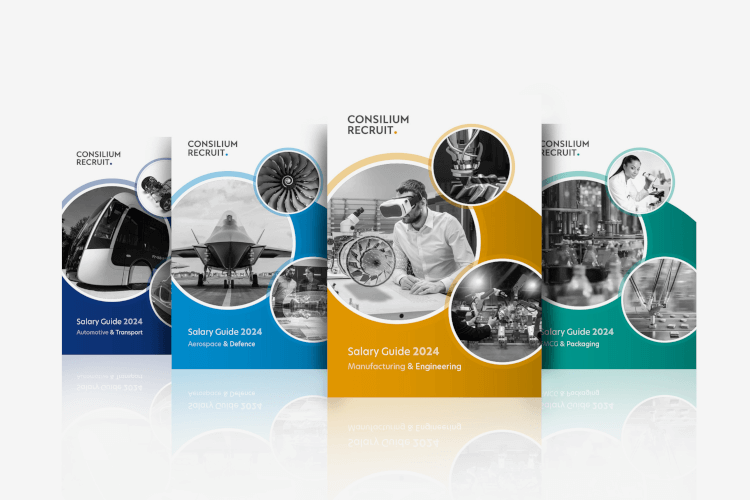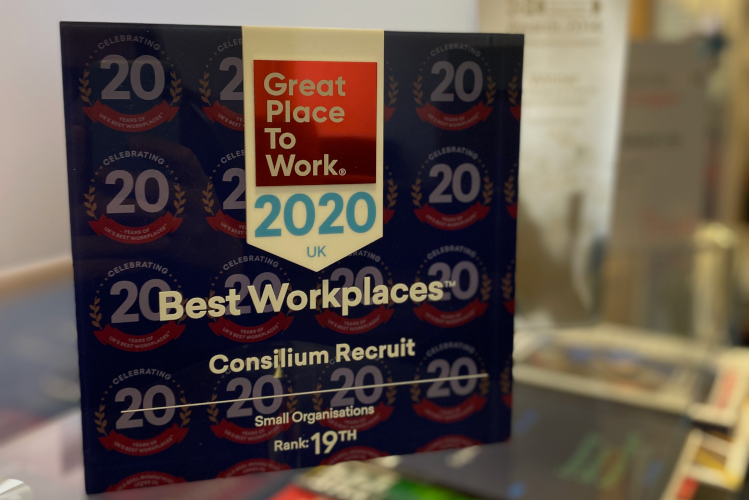Consilium 2023 Salary Guides - available to request now!
Consilium 2023 Salary Guides - available to request now!
With employment at an all-time high and set against a current backdrop of political and economic uncertainty in the UK, ability to make recruitment market predictions has never been more difficult!
However, one thing is certain; for employers to optimise their ability to attract as well as retain the best talent, then we provide some essential guidance on recruitment trends coupled with latest salary and benefit awards covering five separate market sectors and available to order free if you follow this link ( https://www.consiliumrecruit.com/consilium-salary-guides)
2023 - A year of genuine uncertainty!
The balance of power between employers and job seekers will always see-saw in line with supply and demand. During 2022, against which this Salary Guide is based, marked the post-Covid recovery era whereby jobseekers undoubtedly held the upper hand.
Skill-shortages, particularly within the manufacturing & engineering arena were at an all-time high.
This in turn caused a scramble for talent between competing employers resulting in upward pressure on Comp & Bens demands coupled with a definite shift towards more permanent flexible working arrangements and WFH provisions as organisations sought to embrace change and increase their appeal in this highly competitive arena.
Of note is the marked reduction of available people from the active labour market, with economic inactivity having increased by over 600,000 people since the eve of the pandemic. This coupled with already historically low unemployment figures, hovering around 3.6% by the end of 2022 amplified the shortages even further.
What is clear is that with so many separate influences and variables at play, employers must be prepared for even more uncertainty to follow in 2023. Only by having an awareness of the challenges and trends facing their specific sector combined with an agile and proactive approach will they be able to navigate them successfully.
For the year ahead, while we stress that there are no certainties – the following recruitment trends are those expected to have influence and shape the labour market for the majority of organisations:
Hiring challenges will continue!
The difficult hiring conditions faced by employers will continue in 2023. The UK continues to experience a large and widening participation gap post-pandemic, amid rising rates of long-term sickness and an ageing population, the size of the UK workforce will shrink.
This means that to attract the talent that is available, employers must become an attractive proposition to join. With candidates likely having freedom of multiple options, then Employer branding is everything.
Branding is a catch-all term but importantly includes a company’s reputation as well as its mission, purpose and culture and should not be neglected. An essential part of any people strategy, the more information job seekers have about a company, then the more likely they are to have a positive impression and pursue the opportunity. This is an obvious way in which to build trust via brutally transparent and honest communication.
Yes, it’s true that leaders are expected to do more than ever before, with line managers increasingly supporting their employees’ mental health, particularly during the lockdown months. The way in which managers engaged with their employees during this challenging period and any resulting support or change management will often be reported to the wider world via social media plus anonymous employer review sites such as Glassdoor.
Hence, a strong and consistent employer brand can have a hugely positive influence on a company and its ability to hire and ultimately retain staff. Accordingly, expect to witness increasingly creative recruitment strategies and employer brand communications during 2023.
Finally, it goes without saying that companies that follow a timely, efficient, and even agile recruitment process will tend to prosper over firms that are too regimented and even cumbersome in their approach.
Flexible working is here to stay!
More flexible and particularly remote working patterns have become a mainstay, especially for knowledge workers, but within the more product or facility-based world of Manufacturing then this is clearly more of a challenge or simply not possible for large swathes of the workforce. As is evident from our research findings found in the guide, the pandemic-enforced shift to widespread remote, hybrid and flexible working has become a highly desirable feature of the labour market and is without doubt here to stay.
Accordingly, this is already having an influence on companies’ abilities to retain as well as attract new talent, including individuals who previously were deemed to be out of range geographically. With significantly more opportunities available to jobseekers than before, retention of existing talent is a major consideration for firms devising growth plans for the year ahead. For businesses, the impact on company culture and sense of community within organisations adopting a hybrid model, particularly for those individuals starting out in their careers is an obvious concern. But what does appears clear, for this to be successful, organisations have to change their approach to people management.
In doing so, aligning to an outcome-based work culture (OBC) where possible is heralded with achieving greater levels of autonomy, innovation, productivity and agility as a result!
Salary is important, but benefits make the difference!
Compensation is the key consideration for jobseekers right now and understandably so in a cost of living crisis. At the time of writing, the UK was deemed to be entering an official recession expected to last well into 2024.
However, compared to previous recessions that are normally accompanied by major increases in unemployment and a resulting reluctance of potential jobseekers presently in employment to risk moving roles – this recession is expected to be different. While unemployment is expected to remain historically low, a greater propensity to change jobs is expected as employees seek to improve their financial situation as part of any job move.
Beyond salary, benefits continue to be a key tool in attracting and retaining workers in this supply led market place. Employers who are able to adapt towards emerging preferences for wellbeing and personal development benefits such as flexible working arrangements and learning & development in favour of in-office perks such as gyms and kitchens.
Prioritise Diversity
With diverse and inclusive teams found to perform better, more businesses are making DEI (Diversity, Equity & Inclusion) a priority. This is resulting in the creation of new policies and processes to ensure all staff are treated with respect and empathy, along with changes to recruitment processes to attract a more diverse pool of talent.
As well as taking a more public stance, these changes include establishing more proactive strategies and policies including; the addition of DEI commitment to company values to help shape culture, provision of bias training, plus use of blind CVs when short-listing CVs.
Of note, with Generation Z now infiltrating the job market, it is widely understood that a company’s position on diversity is a key factor in their decision to work there. Taking this into account, it is important for companies to adapt their recruitment strategies to align with their values accordingly.
These typically include work life balance, wellbeing, and a focus on quality over quantity especially in a post-pandemic world. If your business wants to attract this new wave of talent then they need to be impressed by the adoption of modern technology plus commitment to the development, both personal as well as professional of all employees.
In short - diversity and inclusion is no longer an addon but essential for any forward thinking business. The UK has benefited from a wealth of overseas talent – particularly within Engineering, Scientific and Technology fields for many years but government policy on the immigration system in recent years has become confusing for employers.
However, following the recent change of prime minister and a boomeranging home secretary, it appears that reforms to update the immigration system by Braverman are more likely for 2023. Of the current options available, these are most likely to focus on high-skilled immigration initially, with employers expected to continue to benefit from existing categories such as the High Potential Individuals (HPIs) scheme and the graduate visa.
Another option being touted is the return of a Highly Skilled Migrant scheme, but this may be some time off yet. Instead, an evolution of policy in 2023 favouring ‘skilled’ or ‘highly skilled’ roles to attract qualified overseas workers is expected. Organisations operating within advanced engineering or technology fields should not fear importing talent or wait for policy to change. Savvy employers should arm themselves with the means such as gaining a Sponsors Licence in order to open up this rich source of available talent.
In summary, thriving through uncertainty is possible but organisations need to be prepared but also agile enough to respond to any changes or opportunities in order to adapt and survive.
So, what can we do for you?
Consilium Recruit is more than a Recruitment Consultancy.
Our strength lies in helping companies to stand out and be noticed among their competition.
From salary & benefit benchmarking exercises, through to helping firms build specialist teams, talent pooling, company branding & promotion exercises, and even providing guidance on importing overseas talent - we have helped numerous startup as well as established group companies to outperform their competitors when it comes to attracting and retaining the best talent possible.
If you have a question about attracting talent to your business, then we’re here to help.
Finally – to request a copy or copies pf our latest industry Salary Guides, then please visit https://www.consiliumrecruit.com/consilium-salary-guides










